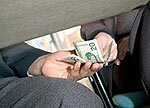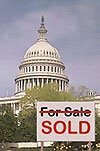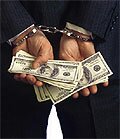Wednesday, May 03, 2006
Today is white collar crime day in Philly!
 Today is white collar crime day in Philadelphia. But rather than write about lawyers giving criminals in suits a better defense for their ill-gotten money, I thought I'd celebrate by focusing in on some folks keeping up our great national tradition of greed and corruption.
Today is white collar crime day in Philadelphia. But rather than write about lawyers giving criminals in suits a better defense for their ill-gotten money, I thought I'd celebrate by focusing in on some folks keeping up our great national tradition of greed and corruption.First off, Harrisburg lobbyist John J. O'Connell pleaded guilty today to a felony mail fraud charge stemming from his embezzlement of as much as $169,000 from Pennsylvania Law Watch, a nonprofit group he founded to lobby for tort reform, in order to pay off his gambling debts.
The mail fraud charge O'Connell, 36, of Marysville, faces has a maximum penalty of 20 years in prison and a $250,000 fine. But U.S. District Judge Sylvia Rambo postponed sentencing until the completion of a pre-sentence report, which is due by June 27.
That's when we might know if O'Connell agreed to cooperate with authorities and wear a wire while lobbying state lawmakers in exchange for leniancy.
There was one sign today that he did. The judge and prosecutor didn't make him elocute - which means the defendant has to admit his guilt by fessing up to what he did in open court for the world to hear.
Instead, he only gave "yes" or "no" responses to questions asked by Judge Rambo (Love that name!) about the plea agreement he reached with federal prosecutors in January.
O'Connell didn't speak to reporters after he left court either, but did issue a brief statement: "Today marks another step of recovery in a 20-year battle with a gambling addiction. I am sorry to all those in my life who have had to deal with a long history of erratic behavior and for the public scrutiny of the last several weeks."
Maybe it was all that on-the-job stress that forced him to bet on 13 baseball games in one day, of which he lost money on 12.
Which reminds me, Pennsylvania is still the only state in the nation not to have a lobbyist disclosure law yet in its House of Representatives. House Speaker John Perzel, who is friends with O'Connell, is working on one in secret, but it won't require lobbyists to show every meal or gift they give lawmakers or even explain why.
Contrast that to an ethics bill the U.S. House approved tonight. Republicans, acting after recent ethics scandals, voted late tonight to require prior approval of lawmakers' privately paid travel, to disclose special-interest provisions in legislation, and to require lobbyists to reveal more about their work influencing Congress. The bill passed 217-213, with only eight Democrats voting for it, because it would do little to prevent corruption abuses such as those by convicted former lobbyist Jack Abramoff and former Rep. Randy "Duke" Cunningham (R., Calif.).
Speaking of Abramoff, the Secret Service agreed Monday to turn over White House visitor logs that will show how often the current king of Washington corruption scandals met with Bush administration officials - and with whom he met.
But presidential spokesman Scott McClellan cautioned reporters Tuesday not to "view it as a complete historical record."
 Abramoff represented Indian tribes in their dealings with Washington politicians. He pleaded guilty in January in Washington to federal charges stemming from an investigation into his ties with members of Congress and the Bush administration. He also pleaded guilty to fraud charges in Miami concerning a multimillion-dollar purchase of SunCruz Casinos gambling fleet in 2000.
Abramoff represented Indian tribes in their dealings with Washington politicians. He pleaded guilty in January in Washington to federal charges stemming from an investigation into his ties with members of Congress and the Bush administration. He also pleaded guilty to fraud charges in Miami concerning a multimillion-dollar purchase of SunCruz Casinos gambling fleet in 2000.Administration officials have refused to say how many times Abramoff, who raised at least $100,000 for President Bush's re-election, has been to the White House. Bush has said he doesn't know Abramoff.
If Abrahamoff is the king, that makes U.S. Rep. Tom DeLay the crown prince of D.C. corruption - or at least alleged money laundering.
But DeLay raised more money to pay legal fees after abandoning any effort to return as House majority leader than he did in the immediate months following his indictment in Texas last year on money laundering charges, the Associated Press reported Monday.
Also in Washington, Mark A. Belnick, the former top attorney at Tyco International Ltd., is paying a $100,000 civil fine to settle regulators' charges involving $14 million in loans he got from the company.
Belnick was actually acquitted in July 2004 of criminal charges of stealing millions by accepting an illegal bonus and abusing company loan programs.
But thanks in part to his helpful advice, former Tyco CEO L. Dennis Kozlowski and former chief financial officer Mark Swartz were convicted of grand larceny, conspiracy, securities fraud and falsifying business records in order to loot about $600 million from company coffers.
The company itself agreed last month to pay a $50 million civil penalty to settle Securities and Exchange Commission charges that its previous management violated securities laws, cooked the books and overstated financial results by at least $1 billion from 1996 through mid-2002.
Tyco is not the only company with questionable business practices.
 Vernon Jackson, chief executive of the Louisville, Ky.-based telecommunications firm iGate Inc., pleaded guilty Wednesday to paying more than $400,000 in bribes to a congressman in charges stemming from an investigation of Rep. William Jefferson, a Louisiana Democrat.
Vernon Jackson, chief executive of the Louisville, Ky.-based telecommunications firm iGate Inc., pleaded guilty Wednesday to paying more than $400,000 in bribes to a congressman in charges stemming from an investigation of Rep. William Jefferson, a Louisiana Democrat.Common Cause, a good government group of which I'm a member, asked the Justice Department on Monday to investigate whether U.S. Rep. Katherine Harris, R-Fla., attempted to obtain a $10 million appropriation for defense contractor Mitchell Wade in return for his financial support.
Harris is a two-term House member who is running for the Senate. However, she is best known as the state official who certified President Bush's 537-vote win in Florida in the disputed 2000 presidential election. Wade, former president of MZM Inc., admitted making $32,000 in illegal contributions to Harris' 2004 campaign for the House.
In Houston, Tx., jurors at the federal fraud trial of Enron Corp. founder Kenneth Lay got a glimpse Tuesday at his lavish lifestyle, including homes in Aspen, a vacation on the French Riviera and $20,000 spent on antiques in Spain. (May we all get Layed, and not in the way Enron employees did.)
However, Lay testified he used about $13 million of personal assets other than Enron shares to meet bank margin calls and other financial obligations in 2001.
Lay received a barrage of written warnings from employees questioning the energy giant's accounting integrity in the fall of 2001 but said on Monday that he was too busy trying to save the company to investigate.
Today, an accounting professor testifying for the defense said Lay did not mislead investors about the company's financial health in the weeks before it plunged into bankruptcy. Yeah, right.
Put this one in the Devil-made-him-do-it department.
A federal jury found Lynchburg, Va. Mayor Carl B. Hutcherson Jr., 62, a Methodist minister, guilty Tuesday of raiding his church's charity to pay his debts - including more than $80,000 in back taxes - with money donated by the Rev. Jerry Falwell and his son.
 In New York, Abraham Alexander, the former accountant of the Cardiovascular Research Foundation, was sentenced Tuesday to two to six years in prison for embezzling $237,162 in heart disease research funds that he used to pay an Ohio dominatrix known as Lady Sage.
In New York, Abraham Alexander, the former accountant of the Cardiovascular Research Foundation, was sentenced Tuesday to two to six years in prison for embezzling $237,162 in heart disease research funds that he used to pay an Ohio dominatrix known as Lady Sage.In Tennessee, former Hamilton County Commissioner William Cotton was ordered to report to prison by June 5. He will be serving three years for being the first government official convicted in what prosecutors called the "Tennessee Waltz" undercover corruption sting.
A jury convicted Cotton in February of conspiring with a lobbyist to extort $4,750 in bribes in exchange for supporting a resolution to benefit E-Cycle Management, a fake company created by the FBI to buy and sell used computers.
Mastering the obvious, U.S. District Judge R. Allan Edgar said during Cotton's sentencing, "I think the word should go out to public officials that if they are corrupt, there are serious consequences. If people think our elected officials are less than honest, they lose faith in government."
That said, please note that Cotton had faced a maximum of 40 years in prison and a $500,000 fine and that he was sentenced three weeks after former Republican state Rep. Chris Newton, who pleaded guilty to accepting a bribe, began serving a one-year sentence.
Four other current or former Tennessee state legislators also have corruption trials pending.
Guess they never learned to get rid of the evidence, unike the folks in Chicago where federal prosecutors say a newly discovered witness admits that on orders from Mayor Richard M. Daley's former patronage chief, Robert Sorich, he deleted a computer index suspected of containing politically sensitive hiring records.
The witness, an unnamed city computer operator, claims that Sorich and another man joked about throwing a hard drive into Lake Michigan, prosecutors said Tuesday.
Closer to home in New Jersey, where they know how to bury evidence and bodies, U.S. Sen. Robert Menendez on Tuesday asked the the Government Accountability Office for a report on the status of federal fine collections from the oil and gas industry.
 "There is no shortage of information regarding fines assessed on oil and gas companies, but it is very difficult to determine how much is actually collected," Menendez wrote in his letter to David M. Walker, the GAO comptroller general. "Particularly when oil and gas companies are making record profits, and consumoers are paying record gas prices, it is important to ensure that companies that break the law are being held accountable financially."
"There is no shortage of information regarding fines assessed on oil and gas companies, but it is very difficult to determine how much is actually collected," Menendez wrote in his letter to David M. Walker, the GAO comptroller general. "Particularly when oil and gas companies are making record profits, and consumoers are paying record gas prices, it is important to ensure that companies that break the law are being held accountable financially."Menendez and the rest of the U.S. Senate will soon take up a measure that sets criminal penalties and fines of up to $150 million for energy companies caught price gouging. The legislation, receiving broad bipartisan support in the House and passed 389-34 on Wednesday.
Maybe Menendez should look at his home state first, though.
In February, Philadelphia-based Sunoco Inc. became the second oil company to settle a price gouging lawsuit brought by New Jersey authorities, agreeing to pay $325,000 but admitting no wrongdoing. Only $50,000 went to help pay heat bills for the poor. The rest went to cover investigative costs, just like all of the $315,000 BP settled a similar charge with in January.
New Jersey is making some progress, though.
The Senate Judiciary Committee is expected to vote on three bills (Senate Bills 67, 153 and 825) Thursday that would impose a minimum mandatory sentence of imprisonment and require the forfeiture of pensions and other retirement benefits for any public official, public employee or elected official convicted of public corruption.
 "I thought it was appropriate that our first committee meeting this year on legislation deal symbolically and substantively with an issue that has been deviling New Jersey and America for many, many years. And that's public corruption," said committee chairman Sen. John H. Adler, D-Camden.
"I thought it was appropriate that our first committee meeting this year on legislation deal symbolically and substantively with an issue that has been deviling New Jersey and America for many, many years. And that's public corruption," said committee chairman Sen. John H. Adler, D-Camden.The committee is also slated to hear bills (Senate Bills 1192, 1224 and 1318) that would establish the crime of corruption of public resources, increase the statute of limitations from five to seven years for certain crimes involving political corruption, and establish a "Public Corruption Profiteering Penalty Act" to increase fines by as much as three times the value of any property involved.
I guess we can simply call that one the bonus round law.
It comes too late to prosecute Tashime Mitchell, 32, of Irvington, and Renita Livingston, 32, of Hillside. Both pleaded guilty Monday to charges that they helped a former state Department of Community Affairs senior field representative Robin Wheeler-Hicks steal more than $866,000 in public funds meant to help the homeless.
Wheeler-Hicks, 46, of Elizabeth, previously pleaded guilty to second-degree bribery and theft by deception. She admitted to submitting at least 428 false applications to the state's Homelessness Prevention Program, which provides housing and rental-assistance.
 |
| 
This Week's Rants | The Daily Rant Archives

This work is licensed under a Creative Commons Attribution 2.5 License.

This work is licensed under a Creative Commons Attribution 2.5 License.


